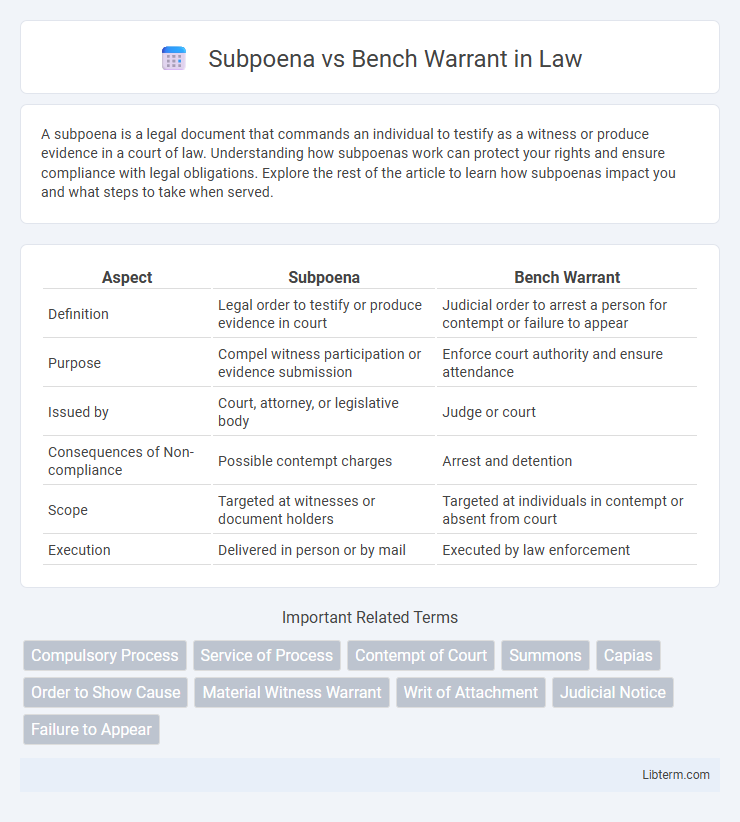A subpoena is a legal document that commands an individual to testify as a witness or produce evidence in a court of law. Understanding how subpoenas work can protect your rights and ensure compliance with legal obligations. Explore the rest of the article to learn how subpoenas impact you and what steps to take when served.
Table of Comparison
| Aspect | Subpoena | Bench Warrant |
|---|---|---|
| Definition | Legal order to testify or produce evidence in court | Judicial order to arrest a person for contempt or failure to appear |
| Purpose | Compel witness participation or evidence submission | Enforce court authority and ensure attendance |
| Issued by | Court, attorney, or legislative body | Judge or court |
| Consequences of Non-compliance | Possible contempt charges | Arrest and detention |
| Scope | Targeted at witnesses or document holders | Targeted at individuals in contempt or absent from court |
| Execution | Delivered in person or by mail | Executed by law enforcement |
Understanding Subpoenas and Bench Warrants
A subpoena is a legal document ordering an individual to appear in court or produce evidence, ensuring witness testimony or relevant materials are obtained during legal proceedings. A bench warrant is issued by a judge to apprehend someone who fails to comply with a court order, such as missing a scheduled court appearance. Understanding the distinction between subpoenas and bench warrants is crucial for recognizing how courts enforce participation and maintain authority in judicial processes.
Definition of a Subpoena
A subpoena is a legal document issued by a court or other authorized body that commands an individual to appear at a specific time and place to provide testimony or produce evidence. Unlike a bench warrant, which authorizes the arrest of a person failing to comply with a court order, a subpoena serves as a summons to ensure participation in legal proceedings. Failure to obey a subpoena can result in penalties, including contempt of court.
Definition of a Bench Warrant
A bench warrant is a court order issued by a judge authorizing the arrest of an individual who has failed to appear in court or comply with a court order. Unlike a subpoena, which compels a person to attend court or produce evidence, a bench warrant directly authorizes law enforcement to detain the individual. Bench warrants ensure court authority is upheld by compelling presence through arrest rather than mere summons.
Key Differences Between Subpoenas and Bench Warrants
Subpoenas and bench warrants serve distinct legal purposes: subpoenas compel individuals to appear as witnesses or produce evidence in court, while bench warrants authorize the arrest of a person who fails to comply with court orders. Subpoenas do not result in immediate arrest, but bench warrants empower law enforcement to detain the individual named. Understanding these key differences is crucial for legal compliance and court procedures.
Legal Purposes of a Subpoena
A subpoena serves the legal purpose of compelling witnesses or evidence to appear in court or produce documents essential for a case's resolution. It ensures the court has access to necessary testimony or materials to establish facts and administer justice effectively. Unlike a bench warrant, which authorizes the arrest of individuals failing to comply, a subpoena primarily functions as a formal demand to participate in legal proceedings.
Situations Leading to a Bench Warrant
A bench warrant is typically issued when a person fails to comply with a court order, such as not appearing for a scheduled court hearing or ignoring a subpoena. Courts issue bench warrants to ensure the individual's presence in legal proceedings, often after attempts to notify the person have failed. Unlike a subpoena, which demands a person to testify or produce evidence, a bench warrant authorizes law enforcement to arrest the individual and bring them before the court.
Responding to a Subpoena: What to Do
Responding to a subpoena requires promptly reviewing the document to understand the demands for testimony or evidence. It is essential to gather all requested materials and coordinate with legal counsel to ensure compliance while protecting your rights. Failure to respond appropriately can result in penalties or a bench warrant for your arrest.
Consequences of Ignoring a Subpoena vs Bench Warrant
Ignoring a subpoena can result in contempt of court charges, fines, or even arrest to compel your appearance, whereas neglecting a bench warrant typically leads to immediate arrest and possible detention until a court appearance. Bench warrants are issued when a person fails to comply with court orders or appear as required, making the consequences more severe and urgent than ignoring a subpoena. Subpoena noncompliance primarily disrupts legal proceedings, but bench warrant evasion can escalate to criminal charges and extended legal complications.
Rights and Obligations Under Each Legal Order
A subpoena requires an individual to appear in court or produce evidence, ensuring their legal obligation to comply with judicial requests while maintaining the right to contest the subpoena's validity. A bench warrant authorizes law enforcement to arrest an individual who fails to obey a court order or appear in court, granting the court authority to enforce compliance but also protecting the person's right to legal representation upon arrest. Understanding these distinctions highlights the balance between court authority and individual rights under each legal order.
Frequently Asked Questions about Subpoenas and Bench Warrants
A subpoena is a legal document issued to compel an individual to testify or produce evidence, while a bench warrant is a court order for the arrest of a person who has failed to comply with a court directive, such as not appearing for a scheduled court date. Frequently asked questions about subpoenas often involve the consequences of ignoring the order, the types of subpoenas (subpoena ad testificandum and subpoena duces tecum), and how to respond properly. Common questions about bench warrants include how to clear a warrant, the differences between a bench warrant and an arrest warrant, and whether the warrant can affect bail or custody status.
Subpoena Infographic

 libterm.com
libterm.com